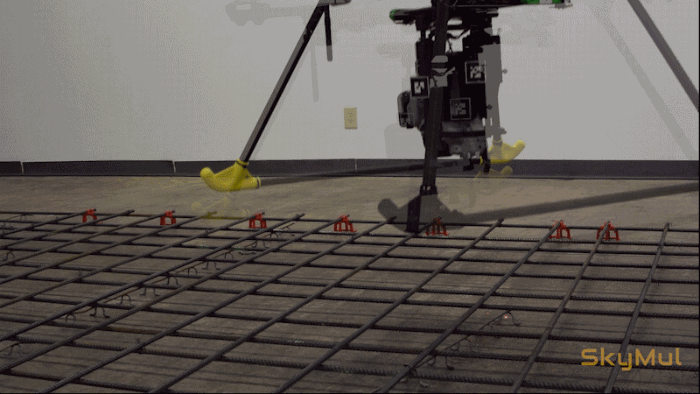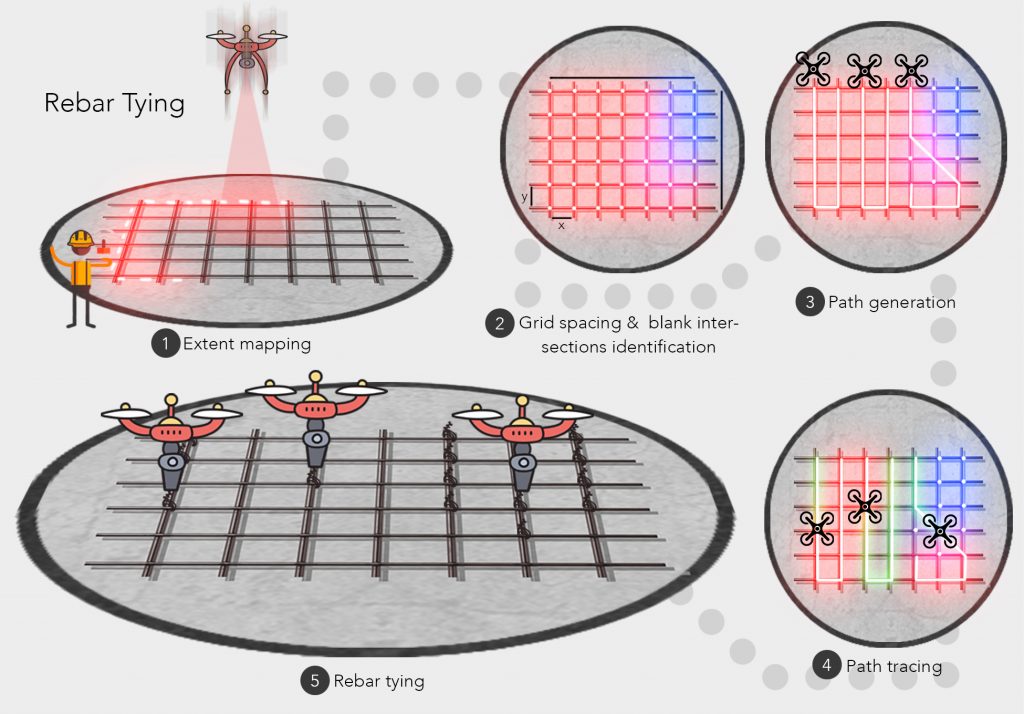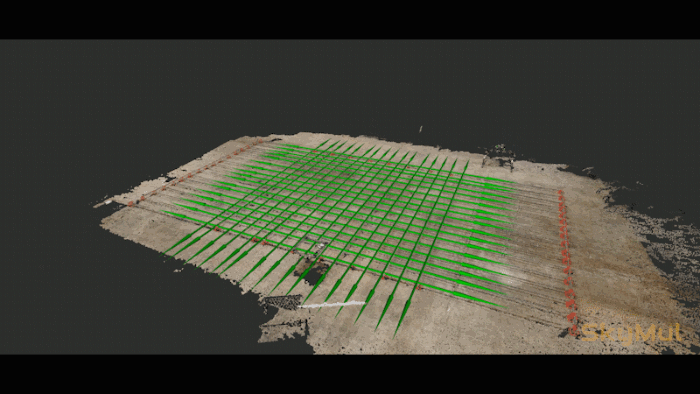There are many jobs in the construction industry that fall under the “dull, dirty, and dangerous” category said to be ripe for automation — but only a few can actually be taken on with today’s technology. One such job is the crucial but repetitive task of rebar tying, which a startup called SkyMul is aiming to completely automate using fleets of drones.
Unless you’ve put together reinforced concrete at some point in your life, you may not know what rebar tying is. The steel rebar that provides strength to concrete floors, walls, and other structures is held in place during the pouring process by tying it to the other rebar where the rods cross. For a good-size building or bridge this can easily be thousands of ties — and the process is generally done manually.
Rodbusters (as rebar tying specialists are called, or so I’m told) are masters of the art of looping a short length of plastic or wire around an intersection between two pieces of rebar, then twisting and tying it tightly so that the rods are secured in multiple directions. It must be done precisely and efficiently, and so it is — but it’s backbreaking, repetitive work. Though any professional must feel pride in what they do, I doubt anyone cherishes the chronic pain they get from doing that task thousands of times in an hour. As you might expect, rodbusters have high injury rates and develop chronic issues.
Automation of rebar tying is tricky because it happens in so many different circumstances. A prominent semi-robotic solution is the TyBot, which is a sort of rail-mounted gantry that suspends itself over the surface — but while this makes sense for a bridge, it makes far less for the 20th floor of an office building.

Enter SkyMul, a startup still in the very early stages but with a compelling pitch: rebar tying done by a fleet of drones. When you consider that the tying process doesn’t involve too much force, and that computer vision has gotten more than good enough to locate the spots that need work… it starts sounding kind of obvious.
CEO and co-founder Eohan George said that they evaluated a number of different robotic solutions but that drones are the only ones that make sense. The only legged robots with the dexterity to pick their way through the rebar are too expensive, and treads and wheels are too likely to move the unsecured rebar. The SkyTy system was developed after early research into the area done at Georgia Tech’s robotics lab.

Here’s how it works. First, a mapper drone flies over the site to mark the boundaries and then, in an automated closer flyover, to build a map of the rebar itself and where the ties will need to go. This map is then double-checked by the rodbuster technician running the show, which George said only takes about a minute per thousand square feet of rebar (though that adds up quickly).
Then the tying drones are released, as many as needed or wanted. Each one moves from spot to spot, hovering and descending until its tying tool (much like those used by human rodbusters) spans the rebar intersection; the tie is wrapped, twisted, and the drone is off to the next spot. They need their batteries swapped every 25 minutes, which means they generally have time to put down 70-80 ties; right now each drone does one tie every 20 seconds, which is in line with humans, who can do it faster but generally go at about that speed or slower, according to numbers George cited.
It’s difficult to estimate the cost savings and value of the work SkyTy does, because the value of the labor varies widely. In some places rodbusters cost more than $80/hour, meaning the draw of automation is in cost savings. But in other markets the pay is less than a third of that, which compounded with the injury risk makes rodbusters a scarce quantity — so the value is in availability and reliability. Drone-based tying seems to offer value one way or the other, but that means the business model is somewhat in flux as SkyMul figures out what makes the most sense. Generally contractors at one level or another would lease and eventually own their own drones, though other methods are being looked into.

The system offers value-add services as well, for instance the precise map of the rebar generated at the beginning, which can be archived and used later for maintenance, quality assurance, comparison with plans, and other purposes. Once a contractor is convinced it’s as good or better than the manually-produced ones currently used, this could save hours, turning a 3-day job into a 2-day job or otherwise simplifying logistics.
The plan at the company is to first offer SkyTy as an option for bridge construction, which is a simpler environment than a multi-story building for the drones. The market there is on the order of $30-40 million per year in the U.S. alone for rebar tying services, providing an easier path to the more complex deployments and expansion to the larger global markets.
SkyMul is looking for funding, having emerged from work done at Georgia Tech through Comcast-NBC accelerator The Farm and then being granted a National Science Foundation SBIR Phase I award (with hopes for a Phase II). They have demonstrated the system but have yet to begin their pilot program with a partner; the construction business isn’t known for its nimbleness and a drone-based solution isn’t trivial to swap in for human rodbusters on short notice, but George is confident that there are early adopters ready to jump on board. Once a few projects are under its belt the company seems likely to find serious traction among forward-thinking contractors.
Construction tech startups are poised to shake up a $1.3-trillion-dollar industry
Social Construct’s computer-optimized buildings could shake construction industry’s foundations
Early Stage is the premiere ‘how-to’ event for startup entrepreneurs and investors. You’ll hear first-hand how some of the most successful founders and VCs build their businesses, raise money and manage their portfolios. We’ll cover every aspect of company-building: Fundraising, recruiting, sales, legal, PR, marketing and brand building. Each session also has audience participation built-in – there’s ample time included in each for audience questions and discussion.































Comment